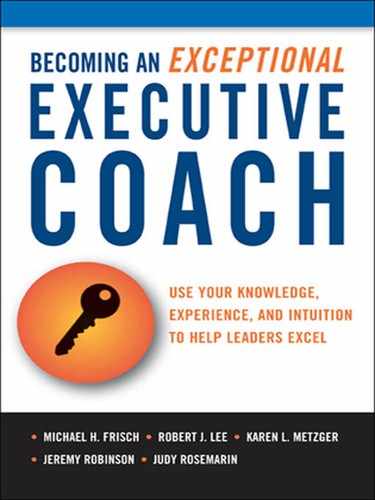Glossary
ACTION PLANS Specific, on-the-job actions to be taken by a client to make progress toward development objectives; they focus on new behaviors and other actions that can be applied in the context of day-to-day work but may also include suggestions for courses, readings, and other development activities.
ASSESSMENT CERTIFICATION Formal training in how to administer and interpret a particular assessment tool, with certification of satisfactory completion usually under the auspices of the publisher of the tool and covers the uses and limitations of particular assessment; for some tools, certification is required in order to purchase and use it with clients.
ASSESSMENT INTERPRETATION Using the results of an assessment tool to make inferences about a client’s work style, interpersonal approach, or other characteristics with on-the-job implications.
ASSESSMENT TOOL OR INSTRUMENT Researched questionnaire eliciting perceptions of oneself (self-report) and/or others’ feedback about a client (multirater assessments); when results are analyzed, the tool or instrument yields a structured report about a client using concepts and terminology unique to that instrument; available from assessment publishing and consulting firms with appropriate certification.
CLIENT In a coaching context, usually refers to the person in the relationship with the coach seeking professional growth and the focus of the coach’s efforts.
CONFIDENTIALITY The safeguarding of privileged client information: oral, written, and electronic; in coaching, there must be a clear understanding of what information can be shared with sponsors since all else would be considered confidential.
CONTAINMENT A broad construct that includes confidentiality, coach self-management, case supervision, and coach knowledge of coaching practices, all aimed at creating a safe and supportive process for client learning and development.
CONTRACTING Process undertaken early in coaching in which coach, sponsors, and client reach consensus about the coaching process, the roles of key participants such as the manager and the client, mutual expectations, assessment tools, milestones and confidentiality.
DEVELOPMENT PLANNING After assessment steps have been completed and results are interpreted coach and client identify key themes or development objectives and then brainstorm action plans for each objective and record the results as a written draft.
DEVELOPMENT PLANNING SKILLS A skill set that includes interpretation of assessment results, insight into the client and the client’s situation, articulation of key themes that represent compelling growth objectives for the client, and suggestion of practical on-the-job actions that will further the client’s development goals.
DEVELOPMENT THEMES OR GOALS Fairly broad, positive, behavioral statements (e.g., “Build stronger relationships with peers,” or “Dedicate more time to coach and develop direct report team”) that articulate where the coach and client agree there is the most payback from invested developmental effort; sometimes referred to as designed objectives.
EMPATHY The ability to imagine oneself in another person’s situation and feel what the other person might be feeling; an important element of emotional intelligence.
EXECUTIVE COACHING A one-to-one development process formally contracted between a professional coach, an organization, and an individual client who has people management and/or team responsibility, to increase the client’s managerial and/or leadership performance, often using feedback processes and on-the-job action learning.
FACILITATION SKILLS A broader term for active listening skills, as in drawing out and helping to expand the ideas of others, using both verbal and nonverbal skills; the goal of facilitation is to help people fully express themselves.
FEEDBACK SKILLS Skills and sensibilities in selecting and phrasing interpretations of assessment results or other observations so that they can be understood by a client and motivate the client to reach conclusions about strengths and development areas.
INFLUENCING SKILLS The ability to present observations and interpretations in ways that persuade others as to their relevance; motivating efforts to change behavior; although a very broad topic, in the coaching context, influencing often involves overcoming defensive or deflective responses to difficult feedback.
INTERNAL COACHING A one-to-one development intervention provided by an employee of the same organization of those who are coached and formally supported by organizational policy and guidelines; internal coaches are empowered to design and deliver programs aimed at individual professional growth, although usually at different levels or containing different features than typical executive coaching engagements.
LIFE or PERSONAL COACHING Similar process to executive coaching except it is contracted and funded directly by the client without sponsor or stakeholder involvement and the goals may or may not be work-related.
PRESENTING ISSUE In coaching, the initial concern(s) described by sponsors or clients that motivated them to seek coaching; often rephrased and made more specific and actionable during the early stages of coaching; sometimes referred to as a felt need.
PSYCHOLOGICAL CURIOSITY A basic interest in understanding why people do what they do; an important capacity for coaches and useful in clients.
SHADOWING Contracted process whereby the coach observes the client in day-to-day meetings and other leadership activities for the purpose of providing immediate feedback as well as evaluating progress on development goals.
SPONSOR(S) Usually refers to those within an organization who contract with the coach to provide services to the client; usually the client’s manager and human resources representative. In larger organizations, sponsors may include those involved in managing the use of coaches or talent development processes.
SPONSOR MANAGEMENT SKILLS Experience and skills in keeping in touch with sponsors during a coaching engagement; getting information and observations from sponsors and sharing contracted information such as progress reports and development plans.
STAKEHOLDERS General term for colleagues of the client who have an interest in the client’s development and may be included in the data gathering about the client and in the follow-up to evaluate progress on the development plan; stakeholders might include the client’s direct reports, peers, internal customers, among others.
SUPERVISION In coaching, a more experienced coach guiding less experienced coaches, usually through case review discussions, primarily to aid the growth of the coach but also to benefit the cases under discussion; supervisors are bound by the same confidentiality commitments made by coaches to their clients.
